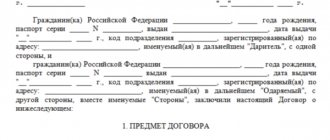Inheritance is the process of transferring to heirs, i.e. persons who can legally claim this property. At the same time, the rights and responsibilities associated with this property are transferred to the heirs.
Inheritance is carried out in accordance with the will left by the deceased . If there is none, then they are guided in accordance with the norms set out in the law, in the order that it establishes.
The testator, when drawing up the orders set out in the will, disposes of his property at his own will and discretion. He himself determines the heirs, as well as the size of the share due to each (this article describes how to receive the due share of the inheritance).
If there is no will, then the inheritance process takes place according to the order established by law. The order is determined by kinship. There are eight queues in total. When and how the heir of a particular line can be called is determined by law. On
Mother's death
According to the law, the heirs who make up the first priority claim first. It includes her children, her husband (read about the rights of a husband after the death of his wife here), as well as the parents, if they are still alive, of the deceased heir, in our case, the mother. Persons are not allowed to inherit:
- unworthy, recognized as such;
- who are denied an inheritance, the reason is not important to us. In the case when there are no children, or one of them, for example, no longer alive, then the descendants of the children inherit it. They become heirs by right of representation. If the heirs were found unworthy or were denied inheritance, then their descendants lose the right of representation.
If there are no heirs in the first place:
- died;
- found unworthy;
- they are denied inheritance;
- there is no right of representation, then heirs from the following queues are called to inheritance, first from the second. This line includes brothers and sisters, relatives, cousins, as well as grandmothers, and, of course, grandfathers, on both sides. Descendants of brothers and sisters can inherit from the deceased when there is a right of representation.
The right of representation means inheritance of the part due to the heir if he died when the inheritance was opened.
Let's return to inheritance. If there are no heirs in one of the queues, then people from the queue next to it are called to inherit. In other words, they will call until all the property of the deceased is distributed. Relatives can take part in inheritance by law in order of priority, which depends on their relationship with the deceased.
According to current legislation, adopted children and dependents who have lived with the heir for a year or more are called upon to inherit. Adopted children are called upon last, when there are no other heirs.
How to inherit after the death of your wife
Entry into inheritance depends on the type of inheritance - either inheritance by law or by will.
Inheritance by will
You should contact a notary office to accept the property specified in the will from the deceased spouse within six months from the date of death of the testator. It is worth knowing that the second copy of the will is kept by the notary who certified this document. The document itself will necessarily indicate the address of the transaction, as well as the person who certified it.
When contacting a notary, it is necessary to prepare a list of documents that confirm the identity of the heir, establish the fact of the death of the testator, as well as documents on the subject of the will itself - i.e. inherited property.
Before deciding whether to accept inherited property or not, it is also worth finding out about your spouse’s existing debts. Perhaps she still has loans and debts for a large amount of money. If he accepts the inherited property, the husband will be obliged to pay off his debts. (Article 1175 of the Civil Code of the Russian Federation). Sometimes this is disadvantageous for the heir, because the inherited property itself is an order of magnitude lower than the value of the debt that will have to be paid for the deceased wife.
In order to find out the value of inherited property, it is worth inviting an appraiser for a specific type of property, who will conduct an assessment and indicate in an expert opinion the market value of this property. When the assessment is carried out and its result becomes known, conclusions can be drawn about accepting or refusing the inheritance.
The period for registering an inheritance is six months . It is set taking into account various situations, collecting documents, searching for a will, etc.
Information
There are cases when a will is revoked in court, but there must be a good reason for this: the will was executed by an incapacitated person who was not aware of his actions, or the will was executed under the influence of someone, or under pressure.
In case of cancellation of the will, the property of the deceased wife will be inherited by persons of the appropriate order according to the law.
Inheritance by law
When contacting a notary, you should bring with you all the necessary documents (copies and originals). The notary will definitely advise the person who contacts him on any questions that have arisen and, after a six-month period from the date of opening of the inheritance, will issue a certificate of the right of inheritance by law. This document is issued personally to each heir who received a certain share of the deceased’s property.
Children's inheritance
Son/daughter
If at the time of death the son or daughter was not legally married and there are no children, then their parents will be the first to inherit. Siblings, as well as sisters, grandmothers, grandfathers on both sides become heirs, constituting the second line.
The rest of the relatives inherit according to the established order . If before their death a brother or sister was married and had children, then the surviving spouse, the children of the deceased, and the parents of the deceased are first called upon. The rest become heirs according to the order if the people who make up the first order are absent. The descendants of the deceased inherit him by right of representation.
Brothers/sisters
If a brother or sister did not leave a will, then the order of inheritance is no different from that described above. Unmarried sons or daughters who do not have children are first inherited by their parents. The rest, including siblings, become heirs of the second or subsequent stages and lay claim to the inheritance.
If at the time of death they were married and had children, then they are first inherited by their spouse, parents, and children.
In the event of the death of children, their descendants by right of representation. It must be taken into account that the right of representation is given to a child who was conceived by the heir, born at the time of opening of the inheritance or after it. Stillborn children cannot be heirs. To be declared an heir with the right of representation, the child must be alive or have lived for some time.
Does cohabitation affect inheritance?
As a general rule, the fact that a brother and sister live together does not affect the specifics of inheritance. Exceptions are situations when actual acceptance is performed, or a dependent person. In order for a person to be assigned this status, he must live with the deceased relative for at least a year before his death. The dependent has the right to receive property together with the heirs of the 1st stage.
Actual entry into inheritance will help if the deadline for contacting the authorized body has been missed and there are no valid reasons. By confirming ownership of the property, a person will be able to register ownership of the object.
What did the parents leave?
Registration of inheritance after death, as we have already said, can be carried out according to a will or by law.
If there is no will, then the law determines that the heirs are called depending on the degree of relationship , according to the order. The order of priority, as we have already said, is established by law, in particular, by the provisions set out in the Civil Code regarding inheritance. If one of the parents has died, then first the surviving spouse, children, parents, if they are still alive, and the deceased are called upon to inherit.
They are entitled to an equal share of the inherited property. An obligatory part is allocated in the inheritance, which can be claimed by minors, as well as the disabled, for example, the parents of the heir and other persons who were dependent on him.
Brother's rights to sister's inheritance
A brother, like a sister, inherits secondarily (Article 1143 of the Civil Code of the Russian Federation). The exception is when a will has been made. The specifics of the distribution of property within its framework are regulated by Chapter 62 of the Civil Code of the Russian Federation. In the document, the testator confirms his will and records who will receive which object. You can deviate from the standard order.
In accordance with the provisions of Article 1143 of the Civil Code of the Russian Federation, the brother will receive the sister’s inheritance if her husband, parents and children abandoned the property. A similar rule applies if there are no representatives of the 1st line. Additionally, the brother may be recognized as a dependent. Such persons inherit taking into account the provisions of Article 1148 of the Civil Code of the Russian Federation. The brother will be assigned the appropriate status if he is disabled and lived with her before the death of his sister. Dependents inherit equally with other persons who are called to inherit.
Grandma's property
If there is no will, then the heirs who are in first place are called. Such heirs include children and spouse, if he is alive. If one of the children, in our case the grandmother, dies, then the grandchildren become heirs (more about their rights and how a grandson can inherit - here) or the grandmother’s great-grandchildren. All other relatives are called upon to inherit according to the law in order of priority depending on the degree of relationship.
The cost of registering the inheritance of a brother or sister
Entering into the inheritance of a brother or sister requires a number of costs. First of all, the state fee is paid. Its size is regulated by Article 333.24 of the Tax Code of the Russian Federation. Brothers and sisters pay 0.3% of the value of the objects. Other categories of persons provide 0.6%. There are additional costs. An independent assessment will be required. Its value depends on the type of property and its quantity. On average you will have to spend from 5,000 rubles. There is no inheritance tax. The exception is income from works of art, literary work, rewards for innovation, inventions, and patents. They are charged deductions to the state in the amount of 13%. There is no difference in tariffs between entering into an inheritance by law or by will. If a person engages a lawyer, his services are paid separately.
Is it possible to refuse the inheritance of a brother or sister?
When entering into an inheritance, brothers and sisters receive not only part of the testator’s property, but also his debts. Therefore, obtaining property is not always profitable. The law allows you to refuse inheritance. Such a right is enshrined in Article 1157 of the Civil Code of the Russian Federation. You can issue a refusal in favor of another person or without his instructions. The procedure can be carried out during the entire period specified for accepting the inheritance. It applies even if the person has already submitted an application. However, you need to remember that the decision cannot be changed later. If a minor or incompetent citizen wants to issue a refusal, the procedure is carried out only with the permission of the guardianship authorities. A sister or brother who does not want to receive the property and possible debts of the brother and sister will have to:
- Submit an application. The specifics of drafting the paper are not fixed by law. You will need to provide information about yourself, the decision you made, and your signature.
- Prepare a package of documents. You need an identity card, a death certificate, papers confirming the right to inheritance.
- Contact the notary office where the inheritance has been opened. The procedure takes place in the state office that serves the last place of residence of the testator.
- Submit a package of documents. The notary will communicate the consequences of the decision and make sure that the applicant truly understands them. If the refusal is conscious, the documents will be accepted.
Is it possible to divide the inheritance by agreement?
Yes, heirs can independently determine the fate of the property due to them by law.
They can do this in 3 main ways:
- When registering an inheritance, adjusting your share with an appropriate refusal in exchange for compensation.
- After registering the inheritance, by donating, exchanging or selling your share to another heir.
- The heirs can enter into a division agreement.
Example. After the death of Alexey N., property remained - a car, an apartment and a garden plot. The heirs - son and daughter - agreed that the daughter would receive the apartment, and the son would take the garden plot and the car. The heirs entered into an agreement on the division of the inherited property, received a certificate of the right to inheritance and subsequently registered the property as determined by agreement.
Find out more about the procedure for dividing inheritance by agreement.
How to divide an inheritance without a will through court?
If the parties were unable to find a compromise on the issue of dividing shares of the inherited property, the only way to resolve this dispute is to apply to the judicial authorities by filing a statement of claim.
Procedure
In order for the process of resolving a dispute over the division of inheritance to proceed without any complications, the following algorithm of actions must be followed:
- Conduct an assessment of the transferred property , including real estate. Such actions are necessary in order to have a more specific idea of the price of the inherited property, as well as to determine the amount of state duty.
- Prepare all the necessary documents confirming the applicant’s claims, as well as draw up the text of the claim. Documentary work is best left to experienced lawyers.
- Submit a claim to the judicial authorities in accordance with all rules of jurisdiction and jurisdiction.
- Take part in the consideration of a legal dispute , as well as receive a final court decision.
- Comply with court orders.
The statement of claim is filed with the district court at the location of the inherited property. The jurisdiction of the magistrate in such cases is not provided, since the application contains a dispute about the law.
Lawsuit: content
The statement of claim for the division of inherited property must consist of the following blocks:
- The name and location of the court in which the document is being filed.
- Full name, place of residence, contact details of the parties to the case.
- The price of the statement of claim, determined based on the value of the share of the inherited property that the plaintiff claims for himself.
- A description of the current situation available at the time the claim was filed, for example, the date of death of the testator, what relationship the successors had with the deceased, actions taken to resolve the dispute peacefully.
- A statement of the applicant’s reasoned position regarding the fair division of the inheritance between all successors, with confirmation of this point of view by the evidence available in the case and the norms of the current legislation.
- The operative part of the claim, in which the applicant sets out the essence of his demands.
- List of attached documents.
- Signature and date.
The document can be submitted either in person or sent by registered mail to the court. An inventory of the contents must be included in the envelope.
Sample claim for division of inheritance without a will
Expert opinion
Stanislav Evseev
Lawyer. Experience 12 years. Specialization: civil, family, inheritance law.
Drawing up a statement of claim for the division of inherited property in the absence of a will is a very difficult task. It is better to entrust it to an experienced lawyer, who will not only competently draw up all the documents, but will also help resolve possible conflicts at the pre-trial stage.
If you are determined to file a claim on your own, you can take advantage of a free consultation with our lawyer.
Sample statement of claim for division of inheritance without a will
Documentation
Along with the statement of claim, the following necessary documents are submitted to the court:
- copies of the statement of claim for all parties to the process;
- copies of passports of participants in the trial;
- death certificate of the testator;
- a document confirming the right to inheritance;
- expert opinion on the estimated value of the inheritance;
- confirmation of payment of state duty;
- other documents that are relevant for the consideration of the dispute.
The majority of documents are submitted in copies, but be sure to take the originals with you to court. The judge may require them to be examined during the trial.
Price
Taking into account the fact that the claim for division of inheritance is of a property nature, the specified document requires an assessment. The state duty is calculated relative to the amount of claims, in accordance with the requirements of Art. 333.19 Tax Code of the Russian Federation. In addition, the plaintiff may incur costs related to assessing the value of the inherited property, as well as the services of representatives.
Dimensions and duty calculation formula
| Cost of claim (r.) | The fee is fixed (r.) | Additional percentage |
| Up to 20,000 | 4% of the claim amount but at least 400 rubles. | No additional interest |
| from 20,001 to 100,000 rub. | 800 rub. | 3% of the amount exceeding 20 thousand rubles. |
| from 100,001 to 200,000 rub. | 3200 rub. | 2% of the amount exceeding 100 thousand rubles. |
| from 200,001 to 1,000,000 rub. | 5200 rub. | 1% of the amount over 200 thousand rubles. |
| More than 1 million rubles | RUB 13,200 | 0.5% of the amount over 1 million rubles, but the duty cannot be higher than 60 thousand rubles. in total. |
Additionally, the plaintiff will have to bear expenses for:
- carrying out technical and assessment examinations;
- obtaining technical documentation for real estate;
- visits to court (if you live in another region or city);
- legal services.
The party in whose favor the decision was made will be compensated for the costs incurred. But since there is no absolute winner in such categories of cases, costs are recovered in proportion to the claims satisfied.
Deadlines
The Code of Civil Procedure of the Russian Federation determines that the total period for consideration of this category of cases cannot exceed 2 months . However, according to practice, the trial may last longer due to the request for additional evidence, the appointment of examinations and other factors delaying the court’s decision.
In this case, everything depends on the specific circumstances inherent in each individual case of division of inheritance.






